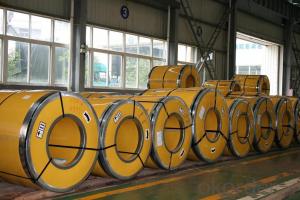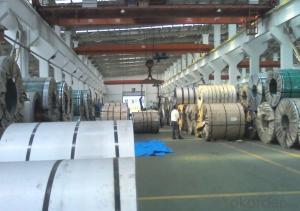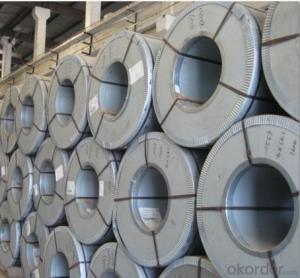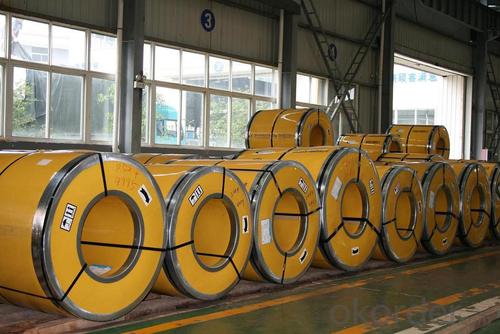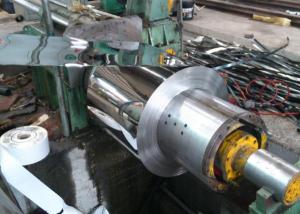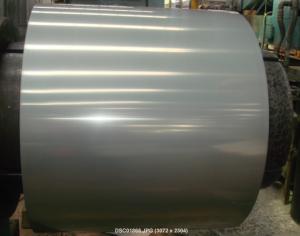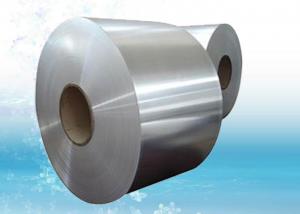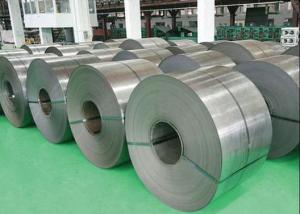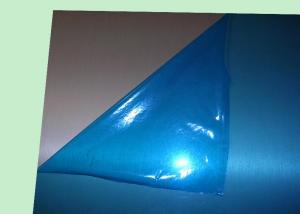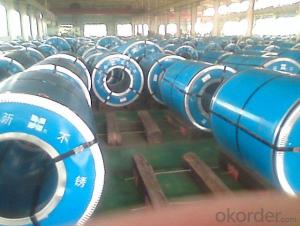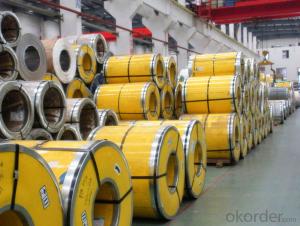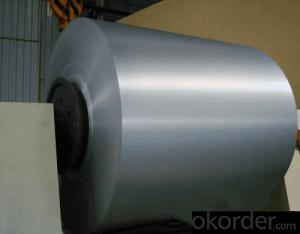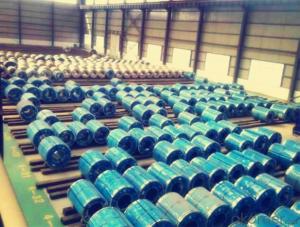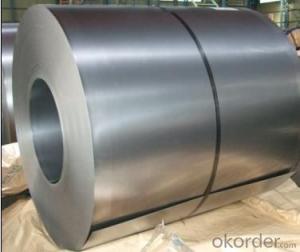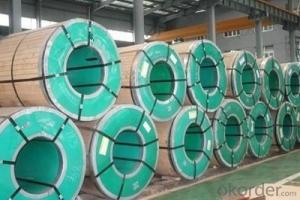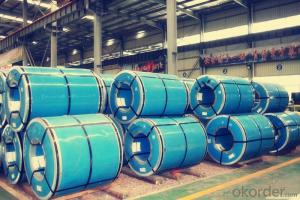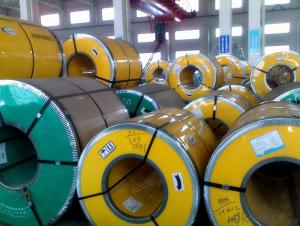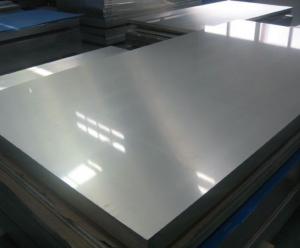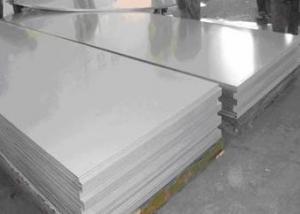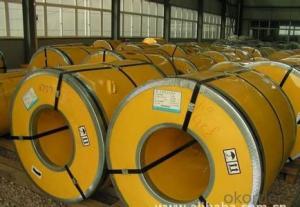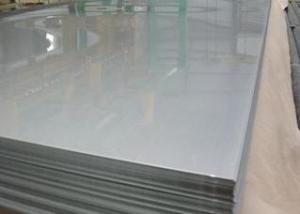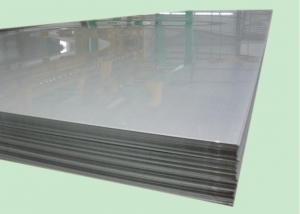Stainless Steel Coil/Sheet/Strip/Sheet 304 Hot/Cold Rolled 2B/BA/NO.1
- Loading Port:
- Guangzhou
- Payment Terms:
- TT OR LC
- Min Order Qty:
- 100 m.t.
- Supply Capability:
- 20000 m.t./month
OKorder Service Pledge
OKorder Financial Service
You Might Also Like
Hot Rolled Stainless Steel Coil 304 Annealing and Pickling No.1 Finish
Stainless steel is a production which not easy rust,acid resistance and corrosion resistance,so it is widely
used in light industry,heavy industry,daily necessities and the decoration industry.
Hot Rolled Stainless Steel Coil 304 Specifications
1.surface:NO.1
2.standard:JIS, AISI, GB
3.width: 0.55m, 0.65m, 1.0m, 1.22m, 1.5m, 2m or requirement
Hot Rolled Stainless Steel Coil 304 Chemical Composition:
(%):C=0.07, Mn=2.00, P=0.045, S=0.030, Si=0.075, Cr=17.5-19.5, Ni=8.0-10.5, N=0.10
Hot Rolled Stainless Steel Coil 304 Physical Properties
Tensile strength σb (MPa) ≥ 520
the conditions yield strength σ0.2 (MPa) ≥ 205,
elongation δ5 (%) ≥ 40
Reduction of ψ (%) ≥ 50,
hardness: ≤ 187
HB; ≤ 90
HRB; ≤ 200H
- Q: What are the storage and handling recommendations for 111 stainless steel strips?
- The storage and handling recommendations for 111 stainless steel strips include storing them in a clean, dry, and well-ventilated area to prevent moisture and corrosion. It is advisable to stack them on pallets or racks to avoid contact with the ground and minimize the risk of damage. Additionally, handling should be done with clean gloves or tools to prevent contamination and scratches on the surface. Regular inspection for any signs of damage or corrosion is also recommended.
- Q: What is the maximum length available for stainless steel strips?
- The maximum length available for stainless steel strips can vary depending on the manufacturer and the specific requirements of the project. However, stainless steel strips are commonly available in lengths up to 20 feet (6.1 meters) or even longer.
- Q: Can stainless steel strips be used in the automotive industry?
- The automotive industry can make use of stainless steel strips, which are versatile and durable. Stainless steel is a material that offers numerous advantages for automotive applications. It possesses excellent corrosion resistance, making it capable of withstanding harsh environmental conditions and exposure to road salts or chemicals. Moreover, stainless steel strips are resistant to heat and can endure high temperatures, making them suitable for various automotive components like exhaust systems and engine parts. Additionally, they possess high strength and can provide structural support and reinforcement for automotive frames and body panels. Furthermore, they can be utilized for decorative purposes, enhancing the aesthetic appeal of vehicles. All in all, stainless steel strips are a dependable and valuable material choice for the automotive industry.
- Q: Can stainless steel strips be used in household appliances?
- Household appliances can indeed utilize stainless steel strips. The exceptional resistance to corrosion, durability, and appealing appearance make stainless steel a popular choice in appliance manufacturing. It is common to find stainless steel strips incorporated into different parts of household appliances like refrigerators, dishwashers, ovens, and stovetops. These strips often contribute to the construction of appliance doors, handles, control panels, and trims. By employing stainless steel strips, appliances acquire a contemporary and polished appearance while also possessing the necessary strength and resilience to endure the rigors of daily use in a household environment.
- Q: How do you cut stainless steel strips?
- Depending on the thickness and length of your stainless steel strips, there are various methods available for cutting them. Here are some commonly used techniques: 1. Manual cutting tools: To cut thinner stainless steel strips, you can employ manual cutting tools like tin snips or aviation snips. These tools have sharp blades capable of easily cutting through stainless steel. However, please note that they may not be suitable for thicker or larger strips. 2. Power shears: For a more precise and efficient cutting process, power shears are handheld electric tools specifically designed for cutting metal sheets, including stainless steel. They are ideal for cutting stainless steel strips of different thicknesses. 3. Metal cutting bandsaw: If you have thicker or longer stainless steel strips, a metal cutting bandsaw is an excellent option. This machine utilizes a continuous loop blade with specially designed teeth for cutting through metal. It provides a smooth and accurate cut, making it suitable for industrial applications. 4. Plasma cutter: A plasma cutter is a high-powered tool that utilizes an electric arc and compressed air to cut through various metals, including stainless steel. It can handle thicker stainless steel strips and provides a clean and precise cut. However, it is important to note that plasma cutters are more expensive and require a certain level of expertise to operate safely. Always ensure you are wearing appropriate protective gear, such as safety glasses and gloves, when cutting stainless steel strips. Additionally, make sure the strip is securely clamped or held in place to prevent any movement during the cutting process.
- Q: Can stainless steel strips be used in the petrochemical industry?
- Yes, stainless steel strips can be used in the petrochemical industry. Stainless steel is highly resistant to corrosion and can withstand high temperatures and pressure, making it suitable for various applications in petrochemical plants such as pipe fittings, heat exchangers, storage tanks, and process equipment. Additionally, stainless steel's durability and low-maintenance characteristics make it a preferred choice for petrochemical facilities.
- Q: Are 111 stainless steel strips suitable for water treatment facilities?
- Water treatment facilities can benefit from the use of 111 stainless steel strips. This type of stainless steel, also referred to as AISI 444, is highly resistant to corrosion, particularly in chloride environments. It is also capable of withstanding both organic and inorganic acids, making it ideal for managing different chemicals and water treatment procedures. Furthermore, stainless steel strips are simple to clean and maintain, ensuring hygienic conditions within water treatment facilities. Overall, 111 stainless steel strips are a suitable option for these facilities.
- Q: What is the minimum thickness available for stainless steel strips?
- The specific grade and manufacturer can cause variations in the minimum thickness of stainless steel strips. Nevertheless, it is possible for stainless steel strips to reach a thickness as low as 0.001 inches (0.0254 mm) or even less. These extremely thin stainless steel strips find frequent usage in precision-demanding and highly corrosion-resistant applications. It should be highlighted that the supplier and the customer's specific requirements may also influence the accessibility of these thin strips.
- Q: Are stainless steel strips suitable for artistic installations?
- Yes, stainless steel strips are suitable for artistic installations. It is a versatile and durable material that can be shaped, manipulated, and polished to create various artistic designs. Its resistance to corrosion and ability to withstand different weather conditions make it an ideal choice for both indoor and outdoor installations. Additionally, stainless steel's sleek and modern appearance can enhance the aesthetic appeal of artistic installations, making it a popular choice among artists and designers.
- Q: How do stainless steel strips perform in seawater environments?
- In seawater environments, stainless steel strips display a remarkable resistance to corrosion and perform exceptionally well. This is because they have a composition that includes a significant amount of chromium, which leads to the formation of a protective oxide layer on their surface. This layer acts as a barrier against corrosion, preventing direct contact between the steel and corrosive elements like salt and moisture in seawater. Moreover, stainless steel strips exhibit outstanding resistance to pitting and crevice corrosion, which are common types of corrosion in marine settings. This resistance can mainly be attributed to the high levels of chromium and nickel present in stainless steel. These elements enhance the steel's ability to withstand the aggressive nature of seawater, ensuring its durability and longevity. Another advantage of stainless steel strips is their versatility and adaptability, making them suitable for various applications in seawater environments. They can be easily formed, welded, and fabricated into different shapes and sizes, offering flexibility in design and construction. In conclusion, stainless steel strips are an excellent choice for use in seawater environments due to their exceptional resistance to corrosion, durability, and versatility. They provide long-lasting performance, require minimal maintenance, and can endure the harsh conditions associated with marine applications. Therefore, they are a reliable and cost-effective solution.
Send your message to us
Stainless Steel Coil/Sheet/Strip/Sheet 304 Hot/Cold Rolled 2B/BA/NO.1
- Loading Port:
- Guangzhou
- Payment Terms:
- TT OR LC
- Min Order Qty:
- 100 m.t.
- Supply Capability:
- 20000 m.t./month
OKorder Service Pledge
OKorder Financial Service
Similar products
Hot products
Hot Searches
Related keywords
